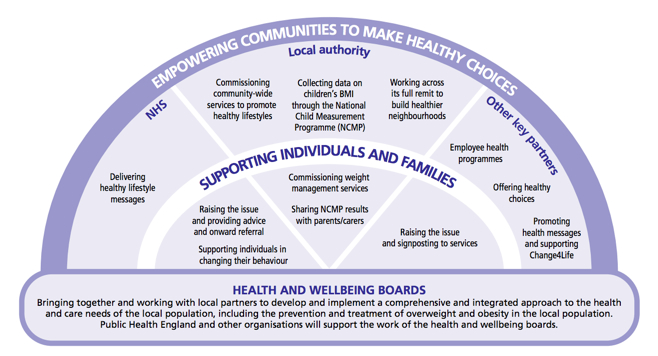Health and Wellbeing Boards
Health and wellbeing boards are based in upper tier and unitary local authorities, and develop a needs-based health and wellbeing strategy to improve local health and care services and the health and wellbeing of local people. The boards bring together key commissioners in the locality—including representatives of clinical commissioning groups, public health, children's services and adult social services, and include at least one elected councillor and a representative of HealthWatch.

The Health and Social care Act 2012 established health and wellbeing boards as a forum where key leaders from the health and care system work together to improve the health and wellbeing of their local population and reduce health inequalities.
Each top tier and unitary authority will have its own health and wellbeing board. Board members will collaborate to understand their local community’s needs, agree priorities and encourage commissioners to work in a more joined up way. As a result, patients and the public should experience more joined-up services from the NHS and local councils in the future.
Health and wellbeing boards are a key part of broader plans to modernise the NHS to:
- ensure stronger democratic legitimacy and involvement
- strengthen working relationships between health and social care, and,
- encourage the development of more integrated commissioning of services.
The boards will help give communities a greater say in understanding and addressing their local health and social care needs.
What will they do?
- Health and wellbeing boards will have strategic influence over commissioning decisions across health, public health and social care.
- Boards will strengthen democratic legitimacy by involving democratically elected representatives and patient representatives in commissioning decisions alongside commissioners across health and social care. The boards will also provide a forum for challenge, discussion, and the involvement of local people.
- Boards will bring together clinical commissioning groups and councils to develop a shared understanding of the health and wellbeing needs of the community. They will undertake the Joint Strategic Needs Assessment (JSNA) and develop a joint strategy for how these needs can be best addressed. This will include recommendations for joint commissioning and integrating services across health and care.
- Through undertaking the JSNA, the board will drive local commissioning of health care, social care and public health and create a more effective and responsive local health and care system. Other services that impact on health and wellbeing such as housing and education provision will also be addressed.
Who will sit on the boards?
The Health and Social Care Bill mandates a minimum membership of:
– one local elected representative
– a representative of local Healthwatch organisation
– a representative of each local clinical commissioning group
– the local authority director for adult social services
– the local authority director for children’s services
– the director of public health for the local authority
Local boards will be free to expand their membership to include a wide range of perspectives and expertise, such as representatives from the charity or voluntary sectors.
Membership is not the only way to engage with the work of the boards, all boards regardless of their political or geographic make-up will be expected to ensure that the needs of local people as a whole are taken into account.